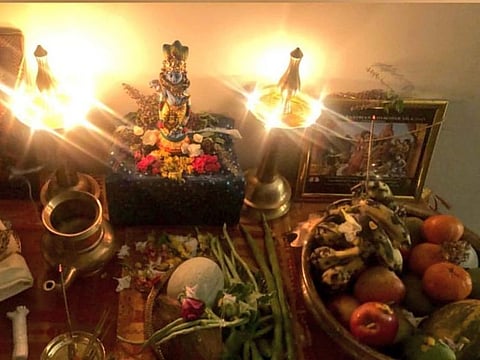Celebrating another Vishu in the time of coronavirus
COVID-19 will have muted the celebrations, but Vishu Kani and sadya will be there

Another Vishu in the time of coronavirus. That means another year of muted Vishu festivities. One that’s celebrated at home with only the family, while friends and relatives remain in the safety of their homes.
Vishu is the day of new beginnings for Keralites worldwide. It’s a Hindu festival in the southern Indian state. Like most festivals in the state, people of all religions join in the celebrations at the homes of friends. COVID-19 has disrupted that, especially since the state has ramped its health safety measures.
How’s Vishu celebrated?
If you are celebrating Vishu, you would have woken up to the fragrance of incense sticks wafting from the Vishu Kani, set up in the living room or the pooja room. Vishu Kani is the first sight on Vishu day.
At the heart of Vishu Kani is kani konna (Cassia fistula, commonly known as golden shower). A Vishu Kani is never complete without these yellow flowers that are intrinsically linked to Vishu. Vegetables will be stacked on a copper plate or bowl in front of an idol of the Hindu deity Krishna. Coins and jewellery too. The nilavilakku (traditional lamp) would be glowing with its radiance spreading all around.
Also Read: COVID-19: When death lost its dignity
Every Vishu evokes the nostalgia of my childhood when I would be sent on errands the previous day to get flowers and fruits plucked from the trees. And on Vishu day, my mother would wake me, wrap her palms around my eyes and walk me to see the Vishu Kani. That hasn’t happened in years, yet those memories bring a lump to my throat.
I no longer get kaineetam (money given on Vishu day) from my father. But I give them to my children now.
Vishu celebrations are muted for me this year. Not because of COVID-19, but due to a bereavement. Normally, there would be no celebrations at all. But COVID-19 has brought our family together for the first time in years. So we will have a scaled-down Vishu.
What’s Vishu?
There was no Vishu Kani in the traditional sense. Just a lamp lit in the morning after I pulled on my mundu (dhoti) and juba (kurta). There won’t be a huge sadya (feast). Instead, we will have a small lunch served on plantain leaves. Not too many dishes. There will be parippu (dal), sambhar, cabbage thoran and pachadi. Chips, pappadam, pickles and bananas too will be there. And semiya payasam (kheer). That’s it.
After lunch, we might retire to the living room to watch a movie aired by one of the Malayalam channels. Or we might watch the film Joji, although it may not suit the occasion.
That will be our Vishu, this year.
Vishu is the first day of Medam, the ninth month in the Malayalam solar calendar. It marks the completion of the spring equinox, and the beginning of Meda Rashi (Aries), the first zodiac sign. Vishu, which means equal in Sanskrit, celebrates the vernal equinox when day and night are roughly the same duration.
Vishu heralds new beginnings. It’s a new year. A year when the world is racing to vaccinate against the new coronavirus. Hopefully, that would give us a chance to start all over.
Sign up for the Daily Briefing
Get the latest news and updates straight to your inbox








